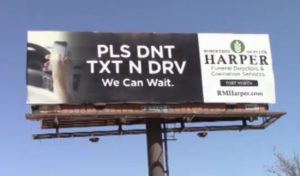Billboard campaigns are done to drive customers to a business, but a Texas funeral home is using billboards for just the opposite…to keep people away. But it’s all in the name of safety. The message is simple, “Don’t text and drive-we can wait.” Mark Lucas-Kelly is an executive for Lucas Funeral Homes, the one behind the ad. He says “It’s humor in a way. You could say dark humor. But we don’t want to be disrespectful either. We see families when they are going through the toughest time in their lives.”
Texas is one of four states that does not have a blanket ban in place for texting and driving, although it is illegal to text and drive in school zones. Fourteen percent of the traffic deaths in Texas are attributed to distracted driving. The percentage is even higher, 16.5%, in the Fort Worth area alone. While these statistics are still lower than the deaths attributed to drunk driving (29%), they are quickly closing the gap, and that is causing safety advocates to push the envelope in their ads.
An Arlington video production company has created a public service announcement based on a horrific distracted driving accident that killed an infant in a stroller. In the nearly 4 minute video, a distracted driver rams a truck that then hits the man and his infant daughter on the sidewalk. The man is injured, but sees his child has died and takes the child’s lifeless body to the driver and screams “Look what you’ve done!”. The family on which the video is based approved the message, hoping that it would resonate and get people to stop texting and driving.
The shock value campaigns are also receiving high marks from others who have suffered the unthinkable at the hands of a distracted driver. Fort Worth resident and mother Kathy Bond lost her 22 year old daughter Katrina when a distracted driver plowed into her daughter’s car in a work zone. Bond says of the shock value campaigns, “We can’t get people to give it up any other way. You have to try every way you can think of. You have to use the shock of it.”
She speaks regularly to high school and college aged drivers and says she thinks most of them understand the dangers of texting and driving. But she says even as more people come to that understanding, there are still a whole segment of people who are not. She says one of the excuses she’s heard for using a device while driving was “boredom.” To that she says, “You’re bored? I’m not bored. I’m trying to operate this heavy vehicle and stay safe.”
Here in Georgia, there has been a statewide ban on texting and driving since 2010.

